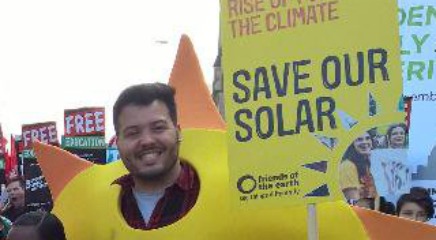Aaron Kiely
Aaron Kiely
London, UK
I grew up in a council flat in Essex next to a disused waste dump, with many grey concrete buildings, and a place called the ‘Flowers Estate’ – that miraculously managed to have zero flowers. Highlights included trips to the dazzling tree-lined streets of leafy outer London, and Saturday’s Iceland shopping trip.
For most of my life, the environment has often felt unpleasant and a problem. My students’ union, societies and volunteering helped politicise me – developing the link between the environment and social justice.
Environmental injustice is an expression of inequality in society.People suffer through fuel poverty, unable to cook hot meals, or heat their homes when we could use renewable power – that doesn’t cost us the planet, unlike fossil fuels. Beautiful well-kept green spaces, are often the privilege of the few. Nutritious, quality food is often expensive. The world’s poorest people, many who are Black, who have done least to cause climate change, are the ones who suffer its worst impacts with floods, droughts and typhoons. That’s why I am driven to try and build a fairer, more sustainable world, for all of us to enjoy.
Since being my students’ union's Environment and Ethics Officer, I was elected as NUS Black Students’ Officer and made clear the case that Black Lives Matter in the fight against climate change. The conversations that we were having even a few years ago with institutions about basic recycling facilities have now transformed in to successful campaigns on divestment from fossil fuels and investment in renewables. This is inspiring.
As a campaigner at Friends of the Earth, I helped organise the largest ever environment demonstration in Britain, calling for ‘Climate, Justice and Jobs’ ahead of the Paris talks, and have organised with communities to keep Britain free from fracking.
I want to see the end of fossil fuels.
If we don’t keep them in the ground we will see continued devastation from extreme weather events that ruin lives, displace many and even kill thousands of people – both here in Britain with floods, and across the world from Pakistan to Dominica.
The biggest obstacle we have to overcome is from fossil fuels companies with their deep pockets and their deep connections to powerful politicians and the media.
But people power is, well, powerful. We have created the solutions and we know there is an alternative. We have to build the broadest, most inclusive diverse movement and fight for green and happy future for all.
